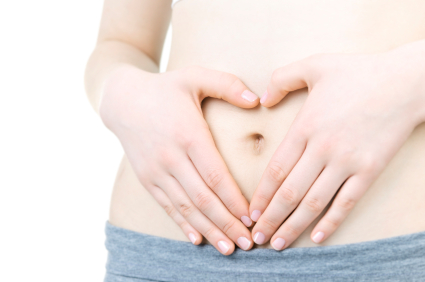The first three months of pregnancy are often mixed with excitement of bringing a new life into your family and anxiety about making sure your unborn baby is healthy. The first few weeks of gestation are vital in determining the course of your pregnancy. If you were planning your pregnancy, your obstetrician probably prescribed prenatal vitamins. If you suspect you are pregnant, schedule an appointment with your doctor right away; he or she will confirm your pregnancy and talk to you about prenatal vitamins, if you are not already taking them. Ask your doctor about medications you take for other conditions and how they will affect your baby.
First Trimester Warnings

Doctors consider the first day of a woman’s last period to be the beginning of the pregnancy. This is about two weeks before conception and when the mother-to-be was ovulating. The fertilized egg will implant itself in your uterus about a week after conception. This process might cause spotting, which is normal and generally not a concern. If you experience heavy bleeding, see a medical professional immediately, as this could be a sign of a miscarriage or ectopic pregnancy. When miscarriages occur, they tend to happen during the first trimester. Ectopic pregnancies“”when the egg implants in the fallopian tube””are less likely, but they can be life threatening and require emergency care.
Pregnancy Symptoms
Your body will experience a lot of changes to prepare for a fetus. Breast tenderness is one of the first signs of pregnancy””they will feel fuller and heavier as hormones stimulate the milk ducts. You might experience fatigue and mood swings because of hormonal changes during the first trimester””as well as the extra energy your body consumes! Women during the first trimester report nausea, frequent urination, food cravings and weight gain. You might experience dizziness, but you can avoid that by slowly rising from seated positions and not standing for extended periods. The muscles of your digestive system will begin to move slower, allowing more time for nutrients to pass to the baby, and this can lead to heartburn and constipation.
Fetus Development
By the end of the first month, the embryo will be approximately 1/100 of an inch long (about the size of a sesame seed). At the beginning of the second month, the embryo will be about ½ an inch long and, by the third month, the embryo becomes a fetus and is fully formed with distinct fingers and toes. The majority of the baby’s organs will develop over the course of the first 12 weeks, including the neural tube, heart and primitive circulatory system, the umbilical cord, the eyes and the intestines. The baby will begin moving his or her arms, but the movement usually won’t be substantial enough for you to detect.